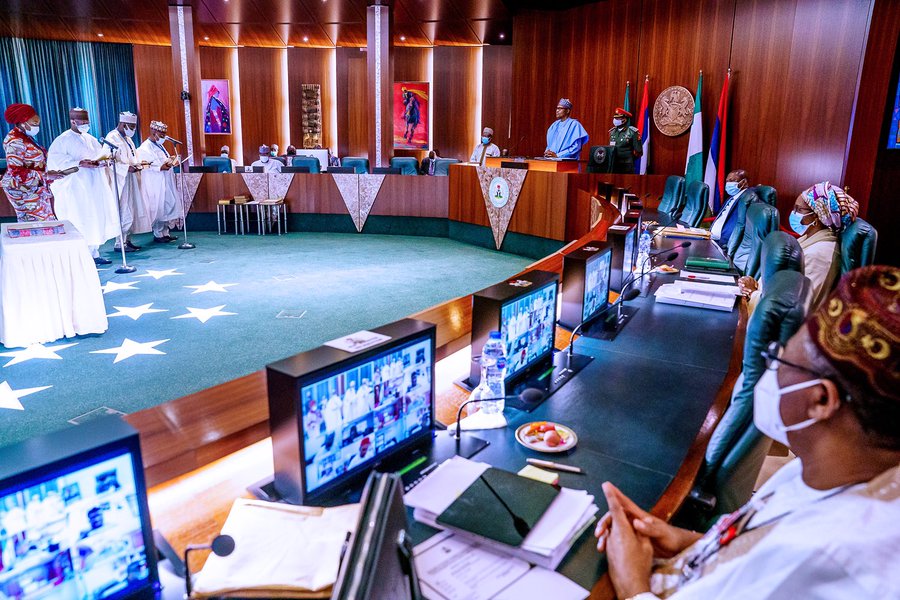– Deficit Hits N4.48tn
President Muhammadu Buhari is set to present the 2021 budget to the National Assembly next week, following the approval of the N13.08trillion estimates by the Federal Executive Council on Wednesday.
Advertisement
It comes with a huge deficit of N4.48tn, as targeted total revenue will tally at N7.9tn.
The budget is also higher than the current revised 2020 budget of N10.8tn by over N2.28tn.
But, the Minister of Finance, Budget and National Planning, Zainab Ahmed, said it’s a budget that would spend as much as N2.08tn or 29 pe cent of the total size, on capital expenditure.
Addressing State House Correspondents after the virtual FEC meeting, the minister spoke elaborately on the budget, saying, “Today, the Ministry of Finance, Budget and National Planning presented to Council the proposal for the 2021 budget. Before presenting the proposal, we also presented the performance of the 2020 budget to July 2020.
Advertisement
“Just briefly, the performance of the FGN budget as at July, for revenue, was 68 per cent. We had a 68 per cent revenue performance prorated to July. The performance of recurrent expenditure, on the other hand, was 92.3% and that is to say salaries were fully paid, pensions were paid, debt service was made, as well as transfers classified as statutory.
“In presenting the budget 2020, we had to report to council some slight changes that need to be made on MTEF 2021/2023, which has since July been sent to the National Assembly by Mr President. Specifically, the exchange rate is going to be changed from N360 that we initially presented and submitted to council and to the National Assembly, up to N379. The reason this is happening is due to the exchange rate movement that the Central Bank of has put in place.
“Also, there were some slight changes on miscellaneous revenues and signature bonuses after interaction with Department of Petroleum Resources, which resulted in some increase in revenue.
“The total budget proposal that is made for 2021 is to enable us to attain a more inclusive growth and also to achieve the key objectives of government, which include stimulating the economy, creating jobs, enhancing growth and creating infrastructural investment, also promoting manufacturing and local production.
“The budget assumptions that were presented to council today include, one; crude oil price benchmark at $40 per barrel. Two, oil production at 1.86 million barrels per day. Three, exchange rate of N379 to US$1. Four, GDP growth target of 3 per cent ; and five, inflation rate of 11.95 per cent.
Advertisement
“We do expect that Nigeria’s economy will recover to the path of growth early in 2021, so the total aggregate revenue that is projected for the 2021 budget is N7.89tn and what is unique about the 2021 budget is that we have brought in the budgets of 60 government-owned enterprises. If you recall, in 2020 we brought in 10, now we have brought in 60.
“These 60 exclude Nigerian National Petroleum Corporation NPC and the CBN and the reason being NNPC, is a national oil company. Internationally, national oil companies are not included in the national budget. Also, the CBN is an autonomous body. Only those two are excluded, 60 government-owned enterprises included. That is to say their revenue and all categories of expenditure are now integrated in the budget.
“We have a total aggregate revenue of N7.89tn and also an aggregate expenditure of N13.08tn for 2021. There is a fiscal deficit of N4.489tn. This represents 3.64 per cent, slightly above what is required by the Fiscal Responsibility Act of three per cent and also to report that the total capital expenditure that is projected in the budget is 29 per cent of the aggregate expenditure.
“This is an improvement over the 24 per cent that we had in the 2020 budget, but slightly below the 30 per cent that we targeted in the economic recovery.
“Just to clarify that the 1.86 million barrels per day crude oil production includes 400,000 condensate, so we have complied with the OPEC quota, which is placed at about 1.5 million barrels per day. So the 1.46 is in meeting with the OPEC quota.
“This is important to us because as you report, if you just report the 1.86, some members of the OPEC appear to think that we are exceeding OPEC quota, whereas we are reporting oil and condensate.”
Advertisement
On his part, the Minister of State for Finance, Clement Agba, raised hopes that the budget would perform well because of the anticipation of a likely rise in crude oil prices in 2021.
“Recall that the revised 2020 budget was at $28 per barrel but now oil is averaging about $40 to $40 something and we have used an exchange rate that is higher N379, benchmark of $40 per barrel and then the production is also much more better. So, we expect to have more revenues to fund the budget.
“There is also a lot of improvement on our revenue generation. Even though we haven’t gotten to where we want to be, but we have seen steady increase in revenue from 2018 till today and we expect that trajectory to continue as we implement the strategic revenue and growth initiative”, he stated.
Also speaking was the Director-General of Budget Office, Ben Akabueze, said, who disclosed that the 2020 budget had been funded by 50 per cent, admitting that it showed that the funding could have been better.



